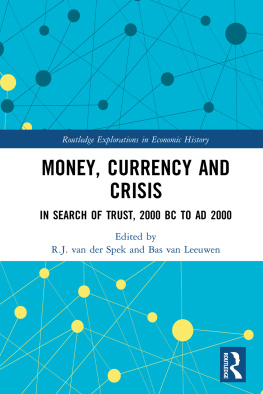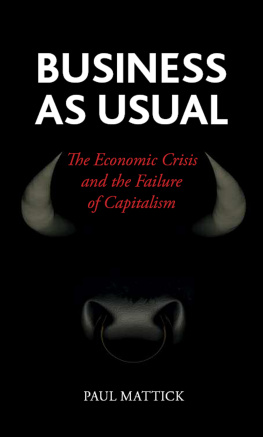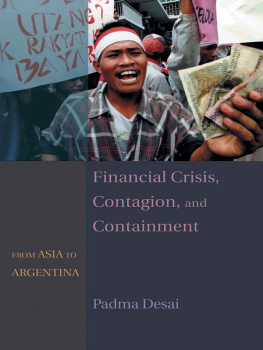Routine Crisis
Chicago Studies in Practices of Meaning
A series edited by Andreas Glaeser, William Mazzarella, William Sewell Jr., Kaushik Sunder Rajan, and Lisa Wedeen
Published in collaboration with the Chicago Center for Contemporary Theory
http://ccct.uchicago.edu
Recent books in the series
Justice Is an Option: A Democratic Theory of Finance for the Twenty-First Century
by Robert Meister
Authoritarian Apprehensions: Ideology, Judgment, and Mourning in Syria
by Lisa Wedeen
Deadline: Populism and the Press in Venezuela
by Robert Samet
Guerrilla Marketing: Counterinsurgency and Capitalism in Colombia
by Alexander L. Fattal
What Nostalgia Was: War, Empire, and the Time of a Deadly Emotion
by Thomas Dodman
The Mana of Mass Society
by William Mazzarella
The Sins of the Fathers: Germany, Memory, Method
by Jeffrey K. Olick
The Politics of Dialogic Imagination: Power and Popular Culture in Early Modern Japan
by Katsuya Hirano
American Value: Migrants, Money, and Meaning in El Salvador and the United States
by David Pedersen
Questioning Secularism: Islam, Sovereignty, and the Rule of Law in Modern Egypt
by Hussein Ali Agrama
Routine Crisis
An Ethnography of Disillusion
Sarah Muir
The University of Chicago Press
CHICAGO & LONDON
The University of Chicago Press, Chicago 60637
The University of Chicago Press, Ltd., London
2021 by The University of Chicago
All rights reserved. No part of this book may be used or reproduced in any manner whatsoever without written permission, except in the case of brief quotations in critical articles and reviews. For more information, contact the University of Chicago Press, 1427 E. 60th St., Chicago, IL 60637.
Published 2021
Printed in the United States of America
30 29 28 27 26 25 24 23 22 21 1 2 3 4 5
ISBN-13: 978-0-226-75264-8 (cloth)
ISBN-13: 978-0-226-75278-5 (paper)
ISBN-13: 978-0-226-75281-5 (e-book)
DOI: https://doi.org/10.7208/chicago/9780226752815.001.0001
Library of Congress Cataloging-in-Publication Data
Names: Muir, Sarah (Anthropologist), author.
Title: Routine crisis : an ethnography of disillusion / Sarah Muir.
Other titles: Chicago studies in practices of meaning.
Description: Chicago ; London : The University of Chicago Press, 2021. | Series: Chicago studies in practices of meaning | Includes bibliographical references and index.
Identifiers: LCCN 2020046172 | ISBN 9780226752648 (cloth) | ISBN 9780226752785 (paperback) | ISBN 9780226752815 (ebook)
Subjects: LCSH: Middle classArgentinaBuenos Aires. | Middle classArgentinaBuenos AiresAttitudes. | CrisesArgentina. | Financial crisesArgentina. | Financial crisesSocial aspectsArgentina. | ArgentinaEconomic conditionsPublic opinion. | ArgentinaSocial conditionsPublic opinion. | ArgentinaPolitics and governmentPublic opinion. | ArgentinaEconomic conditions21st century.
Classification: LCC HT690.A7 M845 2021 | DDC 305.5/5098211dc23
LC record available at https://lccn.loc.gov/2020046172

This paper meets the requirements of ANSI / NISO Z39.48-1992 (Permanence of Paper).
Contents
In Argentina, the story goes, neoliberalism ended on December 21, 2001, when President de la Ra fled the presidential palace by helicopter in acquiescence to the demands of a newly cohered national public. He fled amidst a financial crisis that was rapidly becoming the worst economic collapse in Argentine history. The upheaval was marked by a dramatic devaluation of the currency, the largest sovereign default in world history, prolonged negotiations over international loans, and the flight of foreign capital. Massive street protests in the cities and road blockades in the countryside accompanied nationally unprecedented levels of unemployment and impoverishment as well as profound political uncertainty.
The widely shared experience of loss and disquiet that had precipitated the presidents flight stood in stark contrast to the bromides offered up by institutions such as the International Monetary Fund (IMF) and the US Treasury, both of which confidently proclaimed the Argentine financial crisis to be a favorable moment for the country to learn from its mistakes and embark on the sorts of modest and prudent policy reforms that would surely usher in lasting prosperity. In vehement opposition to those sorts of proclamations, which bitterly defended the tenets of the Washington Consensus even as they lamented the unforeseen consequences of its imperfect application, many people within Argentina and abroad saw in the crisis the opportunity for profoundperhaps even revolutionarychange. From this perspective, the crisis had finally revealed fundamental, long hidden, but now undeniable problems that far exceeded the scope of mere reform.
Indeed, during the heady days of 2001 and 2002, there was not only the sense of loss but also the sense of optimism that the crisis might mark a definitive end and a new beginning, that the upheaval might grant people a measure of conscious agency as they seized the moment and steered history in a new direction. That sentiment of hopeful historical agency was not confined to the Left, as Argentines across the political spectrum saw in the crisis irrefutable evidence of a bankrupt political, economic, and social system. However, its widespread resonance lent considerable plausibility to long-standing critiques of neoliberalism, which, however vaguely defined in popular discussions, seemed to nearly everyone in Argentina a now discredited, even fraudulent, mode of governance. As such, the crisis seemed to many to have inaugurated a new historical moment and a new radical generation (Munck 2001, 83) capable of taking full advantage of its possibilities.
Much of the writingacademic, journalistic, activist, and otherwiseon the 20012002 Argentine financial crisis has focused on these years and on this radical potential. Attending to practices such as barter clubs, neighborhood assemblies, worker cooperatives, and street protests, numerous works have argued that the crisis catalyzed new sites of emancipatory, progressive democratic possibility. In this way, analyses of the 20012002 Argentine crisis have allowed it to circulate globally as an icon of the crisis logic of finance capitalism but also as a space of hope (Harvey 2000).
Those remarkable practices were real, as was the hope they occasioned. However, the most spectacular dimensions of a crisis are not necessarily its most consequential. And, while the story of neoliberalisms end may well be a compelling one, it is a story that requires us to ignore the many profound continuities between pre- and post-crisis Argentina. In fact, for many Argentines, the sense of newly emergent futures that they felt in the tumultuous days of 20012002 quickly gave way to a profound sense of disillusion, not only with the promises of the neoliberal 1990s, but also with the promises of crisis itself to serve as the pivot for historical transformation.
In our rush to locate spaces of hope, immanent alternate realities, and emergent possibilities for a renewed future, we risk failing to confront another, countervailing but no less significant social dynamic, that of radical negativity not recuperated by the dialectic of social reproduction (Munn 1986), of the relentlessly fateful quality of historical time (Sewell 2005) and of the all-too-human incapacity to restore that which has been destroyed (Adorno 1994). It is in attending to the lived, ethnographic reality of radical negativity in this sense that we can see how peoples ongoing, often conflictual, interpretive engagements with the past create futures that can be uncanny, discomfiting, or ironic, even as they are also unpredictable and essentially open-ended. Such an approach allows us to grasp the import of ethnographic experiences like disillusion and disorientation, failure and self-destruction, and to see how they are produced in the real-time unfolding of interpretive practice. The interminable logic of that unfolding means that we need neither resign ourselves to the conclusion of fated ruin nor demand that history offer us a narrative of hopeful redemption.







 This paper meets the requirements of ANSI / NISO Z39.48-1992 (Permanence of Paper).
This paper meets the requirements of ANSI / NISO Z39.48-1992 (Permanence of Paper).